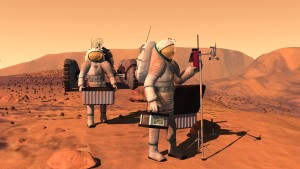Space travel always has intrigued me.
I wanted to fly into space. Indeed, I applied once for NASA’s “journalist in space” program, hoping the space agency would pick me to be the first working journalist to report from Earth orbit.
The program ended on Jan. 28, 1986, when the shuttle Challenger blew up, killing all seven crew members — including the first teacher ever chosen for a space mission.
Well, we’ve been to the moon. Twelve men walked on its surface, making them quite an exclusive club of adventurers; there should have been 14 of them, except that Apollo 13 didn’t make it to the moon’s surface.
One of those men was interviewed by the AARP magazine and was asked about a possible — if not probable — flight to Mars.
Edwin “Buzz” Aldrin, the second man to set foot on the moon during the Apollo 11 mission, said the greatest danger facing those who land on Mars will be “mental status. It is the growing isolation, the irritation, the realization that this is the way it’s going to be.”
Think about Aldrin, by the way, for just a moment. Does anyone know off the top of their head the name of the second person to fly solo across the Atlantic Ocean? Or the second person to break the sound barrier in a jet? Most of us, though, do know the name of the second man to walk on the moon. Hey, I’m just thinking out loud for a moment.
I’ve tried to ponder over the years as a Mars mission became more of a probability: How does NASA find the right person to participate in a mission that will take years to complete?
What in the world does the space agency ask the prospective candidate?
How will you cope with knowing you’re going to be many millions of miles from Earth? How willing are you to accept the possibility that you might not return home? The moon missions were a relatively simple mission compared to this one; do you have what it takes to spend years in a space suit?
I guess I am intrigued by the psychological makeup of the individuals chosen to make this journey.
Aldrin has written that we could land on Mars by 2040. Let me see: I’ll be 91 by then. That’s too old to make the trip.
However, if my luck holds out, I’ll be around to see it and if my luck is even better, I’ll have enough of my marbles still intact to know and appreciate what’s happening in real time.
Aldrin thinks the commitment to land on Mars will come during the next president’s administration. “The next president,” he told AARP, “will use the 50th anniversary of the Apollo missions to say the U.S. will lead international efforts to land on Mars within two decades.”
I pray that he’s right.
